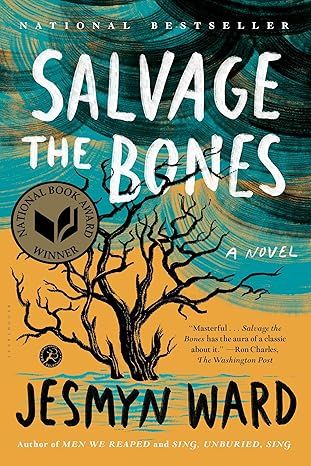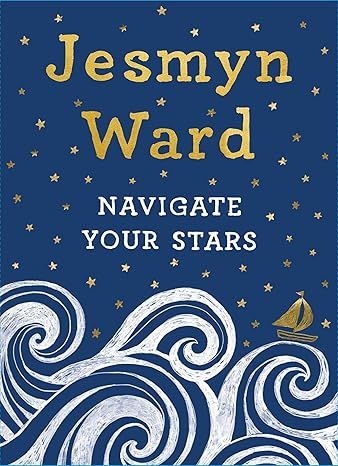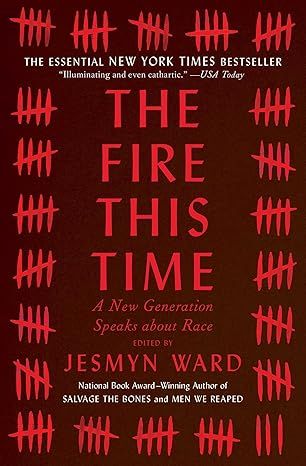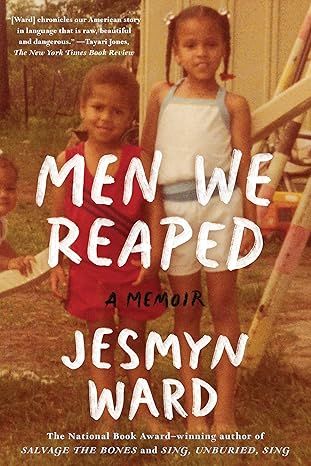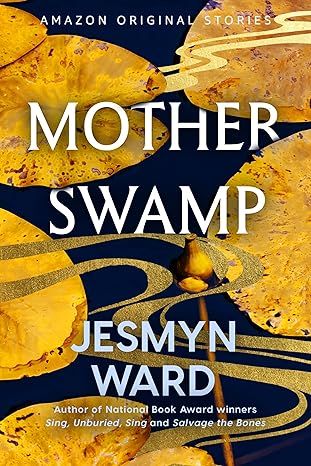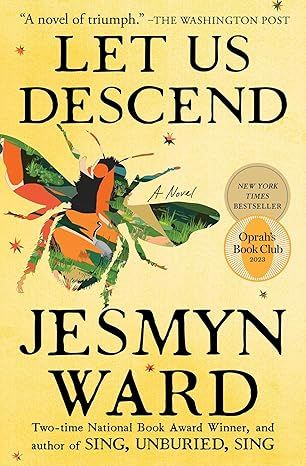Salvage the Bones: A Novel
4.3 out of 5
5,942 global ratings
Winner of the National Book Award
A New York Times Best Book of the 21st Century
An Atlantic Great American Novel of the Last 100 Years
"A taut, wily novel, smartly plotted and voluptuously written . . . Jesmyn Ward makes beautiful music, plays deftly with her reader's expectations." -Parul Sehgal, New York Times
The National Book Award-winning novel from the author of Let Us Descend and Men We Reaped-a gritty but tender story of family and poverty in the days leading up to Hurricane Katrina.
A hurricane is building over the Gulf of Mexico, threatening the coastal town of Bois Sauvage, Mississippi, and Esch's father is growing concerned. A hard drinker, largely absent, he doesn't show concern for much else. Esch and her three brothers are stocking food, but there isn't much to save. Lately, Esch can't keep down what food she gets; she's fourteen and pregnant. Her brother Skeetah is sneaking scraps for his prized pitbull's new litter, dying one by one in the dirt. Meanwhile, brothers Randall and Junior try to stake their claim in a family long on child's play and short on parenting.
As the twelve days that make up the novel's framework yield to their dramatic conclusion, this unforgettable family--motherless children sacrificing for one another as they can, protecting and nurturing where love is scarce--pulls itself up to face another day. A big-hearted novel about familial love and community against all odds, and a wrenching look at the lonesome, brutal, and restrictive realities of rural poverty, Salvage the Bones is muscled with poetry, revelatory, and real.
288 pages,
Kindle
Audiobook
Hardcover
Paperback
First published April 23, 2012
ISBN 9781608196265
About the authors
Jesmyn Ward
Jesmyn Ward received her MFA from the University of Michigan and has received the MacArthur Genius Grant, a Stegner Fellowship, a John and Renee Grisham Writers Residency, and the Strauss Living Prize. She is the winner of two National Book Awards for Fiction for Sing, Unburied, Sing (2017) and Salvage the Bones (2011). She is also the author of the novel Where the Line Bleeds and the memoir Men We Reaped, which was a finalist for the National Book Critics Circle Award and won the Chicago Tribune Heartland Prize and the Media for a Just Society Award. She is currently an associate professor of creative writing at Tulane University and lives in Mississippi.
Read more
Reviews
Gary Carden
5
00 361 pages Hurricane Katrina spawned an awesome number of literary works
Reviewed in the United States on March 3, 2016
Verified Purchase
Salvage the Bones by Jesmyn Ward New York: Bloomsberry $24.00 361 pages
Hurricane Katrina spawned an awesome number of literary works, and it may be that, given sufficient time to determine the full merits of Jesmyn Ward’s novel, Salvage the Bones, her work may be the most worthy. Perhaps the theory that great disasters (wars, natural disasters) invariably produce great works of art (operas, novels, paintings, etc.). This theory was often discussed by Flannery O’Conner who commented on the irony of the “creative renaissance” in southern literature which owes its origin to the extensive suffering and injustice associated with slavery and the Civil War.
The narrator of Salvage the Bones is Esch, a fifteen-year-old girl living in Bois Sauvage, a predominately black bayou town which happens to be in the direct path of Katrina. Set in the twelve days leading up to, and just after the arrival of the hurricane, the novel presents each day as a distinct vignette. Esch and her brothers spend each day preparing for the terrifying arrival. They have no intention of leaving and attempt to help their drunken father reinforce their shack with sheets of plywood. They collect and store bottles of drinking water. Food supplies tend to consist of Top Ramen moon pies, vienna sausage, potted meat and eggs gathered in the woods.
However, despite Katrina’s approach, Esch and her brothers seem to be primarily concerned about their white pit bull, China who has just given birth to five pups. China has developed a reputation in the dog fights that take place in “The Pit” in Bois Sauvage. She is a killing machine, a fact that makes Esch and her brothers the envy of their neighbors. The family’s meager economic security depends on China and each day is spent grooming, washes and feeding her. Indeed they fawn over the big dog, telling everyone that her puppies will grow up to have a killer instinct and therefore, they are invaluable. Much of the intrigue in Esch’s daily life revolves around protecting China and her pups. Skeetah is Esch’s oldest brother and the dog’s self-appointed trainer.
Esch has a multitude of problems. She struggles to love her handicapped father and is haunted by the memory of her mother’s death. Now, she discovers that she is pregnant by Bois Sauvage’s “golden boy,” Manny, the boy who put the baby inside her is totally indifferent to the consequences of a rough and tumble frolic in the dark. As each day brings more distress, the homely, pug-faced teenager turns to her imagination, searching for a means to deal with the world around her, and as luck would have it, that is Edith Hamilton’s Mythology, which was a required reading at school. Esch begins to see the people around her as characters in her favorite book. She observes that all the girls in Bois Sauvage seem to be acting like their mythical counterparts: Psyche, Eurydice, Daphne - all of them running away from something or running after someone. However, the mythical character that Esch selects for her own role model is an ominous one. It is Medea, the fierce and vindictive wife of “the golden-haired Jason, who kills her own brother when he stands in the way of her love for Jason; and when that love turns to hate, she then murders Jason’s new wife, Creusa, her father, Creon and even kills her own children.
Of course, Esch is not going to harm anyone. Although she is filled with rage at the world around her, she is actually one of the forces that is holding everything together; China, the white pitbull is another. When Katrina reaches landfall, it comes like some apocalyptic act of God, sweeping everything away, including Esch’s home and all of their feeble efforts to battle the rising water. In the end Salvage the Bones acquires a kind of epic grander. Like Noah or Gilgamesh, the waters finally withdraw, leaving a confused and humbled Bois Sauvage. How much has been lost? The puppies are gone and so is China - but given the dog’s character, she may have survived. Perhaps Skeetah and his brothers will find her.
The reader is left with a singular image. Skeetah, the oldest brother sits in the wreckage of their home, and while everyone else is searching for missing children, furniture and cars, Skeetah looks at his brothers and announces, “She will come back to me.” Esch tells us:
“He will watch the dark, the ruined houses, the muddy appliances, the tops of the trees that surround us whose leaves are dying for lack of roots. He will feed the fire, so it will blaze bright as a lighthouse. He will listen for the beat of her tail, the padding of her feet in the mud. He will look into the future and see her emerge into the circle of his fire, beaten dirty by the hurricane so she doesn’t gleam anymore. So, she is the color of his teeth, his eyes, of the bone bounded by his blood, dull but alive, alive, alive, and when he sees her, his face will break and run water.
And what of Esch who loves the white dog? She says that China will look at me and know “I am a mother.”
Hopefully, it is apparent that this is a remarkable book. However, it was almost lost in the loud braying and confusion that dominates much of publishing business now. Even so, it won the National Book Award in 2011. Now, after a strange silence, it is beginning to get the attention that it deserves.
Read more
13 people found this helpful
Robyn Stuart
5
Wordsmith extraordinaire
Reviewed in the United States on August 9, 2024
Verified Purchase
Ms. Ward paints such a vivid picture of the Batiste family, the Mississippi Gulf community and the devastation from Katrina that I felt I was a first hand witness. Enthralling Couldn't put it down. Read all her books.
Kindle Customer
5
Heartbreaking but wonderful
Reviewed in the United States on August 18, 2024
Verified Purchase
Hard to read but could not put it down. Highly recommend to anyone who loves a story that makes you truly feel like you were there.
Amazon Customer
5
however the family takes precautions leading up to the storm to plan for one of the worst natural disasters in American history
Reviewed in the United States on November 23, 2015
Verified Purchase
Salvage the Bones is a deeply personal account of a young woman, Esch, and her family's life in the few days before Hurricane Katrina. The novel is set on the family's land in a small town in Mississippi. She lives with her father, her mother seven years deceased, and her three brothers, Skeetah, Randall, and Junior. Esch has recently learned that she is pregnant with the child of one of her older brother's friends. Skeetah takes care of his pitbull, China, helping her give birth and grooming her to fight for the family's honor. Randall plays basketball in hopes of gaining a college scholarship. Junior is a product of the mother's death, as she passed away giving birth to him, and leaves the family to mother him for the rest of his life. The novel describes the family's relationships with one another before the hurricane will rock them and test their connections to one another.
The novel is not set decisively around the hurricane, however the family takes precautions leading up to the storm to plan for one of the worst natural disasters in American history. Jesmyn Ward provides a semi-autobiographical context of the hurricane, as she was born in a small, rural community in Mississippi, similar to the one she describes in Salvage the Bones. Ward writes commonly in this tone, and her newest novel, Men Who Reaped, describes the lives of four men in her life that had suffered deaths far too young.
The novel is poetic in its writing style, and a beautiful read. Ward describes herself as a "failed poet," however, by reading the novel, it is clear that she succeeds in her poetry. Metaphors follow each line of description, and Ward is able to connect figurative language with the colloquial language of characters living in a rural community. It is undeniably pleasurable to read through the pages. Ward creates lovable characters and leaves the reader longing to discover what happens after the hurricane, and how the favorite characters are surviving in the wake of the natural disaster. There is a large dog presence throughout the novel, in addition to family ties, the novel provides a sense of companionship and a person's human relationship with his dog. The dog becomes a member of the family, and the relationship is called into question with the severity of the storm and the need to hold onto the most important things in times of crisis. I am overwhelmed with the poetic nature of this book and applaud Ward as an exceptional writer.
Read more
Readergurl
5
Amazing Book...
Reviewed in the United States on October 21, 2013
Verified Purchase
It takes a lot nowadays for me to rate any Fiction book 5 stars. I read way more non-fiction, and usually only read highly recommended fiction, or some that's given to me.
There are plenty of other reviews here that tell you how it's not a "happy" book (why that matters i dont know), so i wont go on about that part. I dont base my reading choices on whether they have a happy fantasy story.
This story is very real. The writing is really good. I have several points that i use to rate a book: the story itself, the actual writing style, the 'entertainment' value, the emotions it brings out - laughter, sadness, etc., and if it's very memorable - either by being very different than anything i've ever read, or by something else about it being very different.
The only point out of all of those that i wouldnt give a 5 would be the writing style/prose - which i'd give a 4. It's very good, but not "amazing" to me like some authors are.
The author brought me into the characters - where i could feel what they were feeling, and i understood why they did the 'bad' things they did - totally. I felt the way they lived, the area, the poverty... As the story progressed, i stayed up one night for HOURS wanting to know what happened - until the sun rose actually.
As the finale was coming - which i had no idea would be the way it was - i was literally gripping the book with both hands and holding it up to my face. I realized this and laughed to myself since i hadnt even noticed. Then - i sobbed thru the last 20 pgs - i havent cried from ANY fiction for a long time. Yes, i get into books and really let them take me away, but this book has a special kind of writing and a special story that i never expected to effect me sooo much.
The author THEN does something so amazing at the very end - when i couldnt believe it could get any better. I KNEW what i wanted to happen - and i kept thinking to myself, "no, it wont - because it will just seem to corny if it does." (Even tho i wanted it so much.) She made it happen in a special way, without making it corny but while bringing me the hope and good feeling i needed after all the sobbing. (I dont want to give anything away just in case you dont know the story.)
This book scores an A+. If you love good, moving, American fiction you will love this.
Read more
16 people found this helpful
AFC
5
but we also learn that China is the love of Skeetah's life
Reviewed in the United States on November 22, 2017
Verified Purchase
In three reviews of Salvage the Bones (New York Times, Washington Post, Kirkus), Jesmyn Ward's National Book Award winning novel, no reviewer focuses on the centrality of motherhood in the book. Ward does in interviews she's given about the book. Also, the narrator's father is described by reviewers as an alcoholic, indifferent and abusive to his children's needs. Almost no one mentions Skeetah, the older brother narrator Esch is so attached to that she can almost feel him as part of her own body. In other words, all of these reviews, in my opinion, get the book wrong and miss the most important parts. Ward's book opens with birth: Skeetah's pit bull China is giving birth to puppies and the reader learns more about the mechanics of that than one might have hoped, but we also learn that China is the love of Skeetah's life. His capacity of care for her is big enough to encompass almost the entire bayou in which they live and ultimately weather hurricane Katrina that is approaching relentlessly throughout the book, villain and goddess of the book. The love Skeetah has for China, that older brother Randall has for youngest brother Junior, that they all have for each other and their Dad's love, flawed as it is, is the sinew that ties the book together and is Ward's contribution. As much as relations and inequalities between men and women and toxic masculinity provide a drum beat throughout the book, it is actually the human capacity for love, the undertold story of infinite male tenderness and even less told story of female ferocity that are its heart. While damaged emotionally and eventually also physically, the children's father spends the entire book preparing for the storm. Amidst his own traumas and anxieties, he gathers resources, boards windows, stores water, worrying as the storm approaches, while no one else heeds his alarm. In a book in which the Greek myths are an undercurrent, he is the chorus, announcing and heeding the omens of doom. Even Big Henry, a physically massive and emotionally stable tree trunk of a presence, reminds Esch over and over until she hears it that he will protect her and care for her, without permitting the selfish distraction of his own desire to drown her, like the boy she sees as a son god, Manny does. But it is the mother force of China, the echoes and remnants of love of the children's own mother lost in childbirth, Katrina and Esch, ultimately, herself, that is the main drive in the book. Like Medea, this force is as capable of wanton destruction (Katrina, obviously but also China's unthinking violence toward her own puppies) as it is of the kind of tenderness that keeps her children's faces unlined, unworried, bathed in love (later, motherless Randall's face is described as a jigsaw puzzle where the pieces don't quite fit), mothers marshal and command the power of the universe. It is not a power to be taken for granted or contained. It spills over, knocking down everything in its path. It is limitless, like when Big Henry's mother has room enough in her own damaged home to take in Esch's family, soothing and nursing them all to comfort. It is this force that Esch, in her coming of age and coming to accept her own impending motherhood, understands she must now marshal.
Read more
101 people found this helpful
Francophile in Michigan
4
Brava, Ms. Ward
Reviewed in the United States on December 10, 2015
Verified Purchase
I read this novel, along with nine others, for a college literature course. Of the ten, this was the only book to elicit a strong emotional reaction from me. There were moments when I hung my head in frustration, threw up my hands in respect (God bless Ward’s writing style), and wiped my face of tears and snot after crying my eyes out. An incredibly moving and poignant novel. The novel opens with its narrator Esch, fourteen years old and pregnant. She often follows her brothers around, and is constantly surrounded by men as well as the gruesome society of dog-fighting. Esch’s predominant male surrounding is, perhaps, the main influence that encourages her to sleep with her brother’s friends, and to submissively pine for the one boy, Manny, who unforgivingly mistreats her. Though Esch’s character was impeccably frustrating, and borderline stereotypical and archetypal, her faults lie with a motherless young girl, who wants to be wanted and loved. Both frustrating and annoying, this characterization was, at times, unlikable, yet that is exactly what made Esch so human. I applaud Ward’s lyrical writing style, as well her ability to write such gruesome and honest depictions that made me literally cringe when reading. Ward is able to effortlessly incorporate poetic language into her novel that, at times, made me set the book in both awe and envy, knowing I would never be able to produce such a product. I did find there to be a disconnect between the poetic language and the colloquial diction. That’s to say, I found it a bit unbelievable that Esch would speak so poorly to her family and friends, yet express herself so eloquently in her narration. Regardless, I found the poetic language to be successful and moving. I knew before reading the book that it was centered on Hurricane Katrina. However, I was surprised that the novel was centered on the build-up to the hurricane. Katrina itself is more or less twenty pages. The chapter pertaining to the hurricane, as well as the aftermath of the hurricane, were the sections of the novel that I found most captivating. Living through the hurricane with Esch and her family was difficult to read, which is perhaps why Ward chose to limit its description. That said, I wish I had more of Katrina and its aftermath. I waited for the hurricane for 200 pages, and it seemed to end as soon as it started. Though I was unsatisfied by the ending, I appreciated that the novel was a work that was not so much about Katrina as it was about survival and family. I was captivated by Ward’s poetic writing and honest characters. I will definitely be on the lookout for her other works, as well as an avid recommender of this novel.
Read more
5 people found this helpful
Gridley
4
Listening to Life
Reviewed in the United States on December 29, 2011
Verified Purchase
I don't remember why I bought this book. It probably wasn't that it won the National Book Award for 2011; more likely that it's about the Mississippi coast in the time prior to Hurricane Katrina. I have family living on that coastline, and have visited the area many times, being from the not-so-far-away Louisiana "hill country." (Don't laugh - there are some.)
I'm white, though, and while all Southerners of all classes and races interact (although they sometimes don't act like it), this book has a lot to say about the underprivileged of all ilks throughout the South. The book is about a black family - or what remains of one - in the two weeks or so leading up to Katrina. The principal character and narrator is the girl of the family, Esch, and she's pregnant. Esch has an alter ego of sorts in her brother Skeetah's pit bull, China, who in the first few pages gives birth to her first litter. Skeetah is something of a dog whisperer, and his hold on China is little short of magical. There's another brother, Randall, who has hoop dreams, and a late addition to the family, Junior. A young lad named Manny has done the dirty with Esch; she's in love with him, and is reluctant to tell him she's pregnant. She goes through all the usual throes of morning sickness, having to guess what's going on in her biology, but she's a plucky kid, and she perseveres. When Katrina hits, the family, which has already been turned upside down by poverty and the brood's mother's earlier death, is turned - I don't know - sideways.
But this isn't a story about victimization. It owes a lot to Hugo's underclass in Les Miserables - they improvise, they adapt, they attempt continually to overcome. Ward's book leaves us with a poignant ending, but one with resilience and promise.
Jesmyn Ward knows how to hold a reader, she takes us deep into the souls of Esch, particularly, but each of the others in the family as well. She paces her story like a pro, never leaving us in despair, with a hint of promise just over the horizon. The story's details are what continued to charm me: Esch-as-narrator's eloquence, her insight (although she often spoke more "street" in dialogue - but it works) into her condition, the family's ongoing plight as well as their separate and collaborative dreams. The attention to nature: the weather, of course, the dog's fleas, ants crawling across Esch's toes, the smell of the unkempt house, the feel of sweat, the ramen and Vienna sausages they eat. Even the details of a series of dogfights.
This book clearly deserves the award. It's about life, and I can tell you it speaks to life as a Southerner, regardless of race, or color, or creed.
Read more
11 people found this helpful
Schuyler T Wallace
4
A STRONG REACTION TO HURRICANE KATRINA
Reviewed in the United States on October 15, 2018
Verified Purchase
Jesmyn Ward brings a unique voice to her novel, “Salvage the Bones,” a story centered around the approach and subsequent impact of Hurricane Katrina to the poor people on the Gulf Coast of Mississippi. I say unique because I believe the intense pace of her narration, depicting the actions of a soon to be slammed people, is clearly reflective of the angst that builds up in desperate lives before, during, and after a disaster. I also sense some irritation on her part about the situation in which they find themselves.
Ward, in many interviews I’ve read, often uses words like angry, furious, and enraged as she reflects on the events of her life, her emotional outlook, and the conditions she has encountered throughout her being. I see that indignation somewhat reflected in the mood and language of the characters found in this book. Yes, I think there’s some anger in her writing and I’m not critical of that. Rather, I’m amazed at how balanced her writing, even if somewhat strident, conveys that point to her readers. She has opinions, unusual in a first time novelist, and, as she tells us, she is disappointed in Southern writers such as Faulkner for failing to fully display the emotional range of their black characters.
The author takes us on emotional jaunts that might be too intense for some readers. The behavior, language, and emotional complexity she uses in her writing are not easy to digest. Yet the potency of the experiences she outlines brings the story to life and welds it into the mind. Still, I detect tenderness in her earnest search for our understanding of her world. Her characters reflect that compassion as they seek to protect each other.
The author presents the existence of the impoverished as they get prepared for the hurricane. At first their attempts appear rather disjointed and unorganized, but being always hungry and suffering physical discomfort seems to weaken their focus. When the actual battle against the storm’s powerful wind and rain begins, they fight courageously for survival. Ward, in frightening detail, is adept at verbalizing these horrendous conditions and the battle to overcome them. I felt helpless but captivated as the storm raged on but soon recognized the resiliency of the stricken locals.
I think the author has done a marvelous job of expressing and vocalizing the struggle and bringing it to the ear of a public that has largely been immune to such occurrences. Her lyrical and relentless voice is a reminder of a life’s experience too often disregarded, forgotten, or ignored. When this book is read, that message is transmitted in indelible detail.
Schuyler T Wallace Author of TIN LIZARD TALES
Read more
8 people found this helpful
Eric Selby
3
An Excellent Writer with Unbelievable Narrator
Reviewed in the United States on January 9, 2012
Verified Purchase
There is so much about this novel that is truly excellent. So maybe it's a bit unfair of me to zero in on the two elements that were not, especially at the beginning of my assessment. But that is what I am doing.
The first-person narrator, Esch, is not a believable narrator. Sure, Jesmyn Ward has the fifteen-year-old girl consistently make the reader aware that she loves Greek mythology, that she sees the life she experiences in the twelve days in which this novel occurs as one parallel to several Greeks in the book she was reading. Unfortunately that alone does not provide enough "evidence" that this girl could write with the mastery that she purportedly has with some of the most wonderful images expressed often as similes. Trust me, I have taught high school and college English for decades. And many of my students have been very good writers--but not as good as Esch. The novel would have had great verisimilitude had Ms. Ward made the decision to write it in third person with the main focus--point of view--being placed on essentially the only female character in the novel.
The novel is set during the days that led up to the catastrophe of Hurricane Katrina. The poor black family--the mother died in childbirth seven years earlier--lives in southern Mississippi. The father is very concerned about preparing for the hurricane although essentially he does little other than pushing his four children to do so. One child, Skeetah, has a beloved pit bull, China, who at the beginning of the novel is giving birth to her first litter of pups. It is a wonderfully described scene and drew me into the novel immediately.
I have lived in Key West and now in Miami Beach where I have experienced hurricanes. Only once have I read a story in which I found the narration believable when describing what it is like to be in a hurricane. Ms. Ward really should not have tried in my opinion because when I got to that chapter--near the end of the novel--I no longer believed. It was just way too melodramatic. I won't go into details. This fifteen-year-old would never have described what she supposedly experienced that way. In fact it is almost like something from a Greek epic, only told in the language of a southern black.
Read more
6 people found this helpful
Top Jesmyn Ward titles
Best Sellers

The Tuscan Child
4.2
-
100,022
$8.39

The Thursday Murder Club: A Novel (A Thursday Murder Club Mystery)
4.3
-
155,575
$6.33

Sapiens: A Brief History of Humankind
4.6
-
140,302
$13.49

The Butterfly Garden (The Collector, 1)
4.3
-
88,556
$9.59

Things We Hide from the Light (Knockemout Series, 2)
4.4
-
94,890
$11.66

The Last Thing He Told Me: A Novel
4.3
-
154,085
$2.99

The Perfect Marriage: A Completely Gripping Psychological Suspense
4.3
-
143,196
$9.47

The Coworker
4.1
-
80,003
$13.48

First Lie Wins: A Novel (Random House Large Print)
4.3
-
54,062
$14.99

Mile High (Windy City Series Book 1)
4.4
-
59,745
$16.19

Layla
4.2
-
107,613
$8.99

The Locked Door
4.4
-
94,673
$8.53
